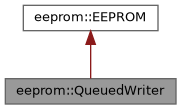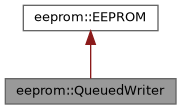API that allows asynchronous writing to EEPROM; this can be useful when you have large amount of data to write but cannot afford to wait until all bytes have been written.
More...
#include <fastarduino/eeprom.h>
|
| template<uint16_t SIZE> |
| | QueuedWriter (uint8_t(&buffer)[SIZE]) |
| | Construct a QueuedWriter from a given buffer array. More...
|
| |
| template<typename T > |
| bool | write (const T *address, const T &value) |
| | Write the content of value of type T to the EEPROM at address. More...
|
| |
| template<typename T > |
| bool | write (uint16_t address, const T &value) |
| | Write the content of value of type T to the EEPROM at address. More...
|
| |
| template<typename T > |
| bool | write (const T *address, const T *value, uint16_t count) |
| | Write value, an array of count values of type T to the EEPROM at address. More...
|
| |
| template<typename T > |
| bool | write (uint16_t address, const T *value, uint16_t count) |
| | Write value, an array of count values of type T to the EEPROM at address. More...
|
| |
| bool | write (const uint8_t *address, uint8_t value) |
| | Write one byte to the EEPROM at address. More...
|
| |
| bool | write (uint16_t address, uint8_t value) |
| | Write one byte to the EEPROM at address. More...
|
| |
| void | erase () |
| | Erase the full EEPROM content. More...
|
| |
| void | wait_until_done () const |
| | Block until all pending operations (queued in the ring buffer) are complete. More...
|
| |
| bool | is_done () const |
| | Tell if there is no queued, nor on-going write operation. More...
|
| |
API that allows asynchronous writing to EEPROM; this can be useful when you have large amount of data to write but cannot afford to wait until all bytes have been written.
The class uses a ring buffer which array must be provided at construction time.
In order for QueueWriter to function properly, you must register a proper ISR. FastArduino provides 3 possible ISR registrations:
- REGISTER_EEPROM_ISR() basic ISR, ensures that all queued writes get written asynchronously
- REGISTER_EEPROM_ISR_METHOD() enhanced ISR, first ensures that all queued writes get handled and when the last byte is written, calls a back a method of a handler class
- REGISTER_EEPROM_ISR_FUNCTION() enhanced ISR, first ensures that all queued writes get handled and when the last byte is written, calls a back a function
Basically it has the same write() and erase() methods as EEPROM class, except:
- its methods are not
static
- methods return immediately without waiting for the operation to be finished
- methods may return
false if the operation overflows the ring buffer
Definition at line 530 of file eeprom.h.
◆ QueuedWriter()
template<uint16_t SIZE>
| eeprom::QueuedWriter::QueuedWriter |
( |
uint8_t(&) |
buffer[SIZE] | ) |
|
|
inlineexplicit |
Construct a QueuedWriter from a given buffer array.
- Template Parameters
-
| SIZE | the size of buffer; this size limits the amount of writes that can be queued and the content size of each write |
- Parameters
-
Definition at line 541 of file eeprom.h.
◆ write() [1/6]
template<typename T >
| bool eeprom::QueuedWriter::write |
( |
const T * |
address, |
|
|
const T & |
value |
|
) |
| |
|
inline |
Write the content of value of type T to the EEPROM at address.
- Note
- Whatever
T type, this method never calls its assignment operator but simply copies, byte per byte, content from local variable content to EEPROM, no T code gets executed.
- Template Parameters
-
| T | the type of content to be written (determines the number of bytes to write) |
- Parameters
-
| address | the location to be written in EEPROM; address is typically obtained as &variable where variable is a global variable that was declared with EEMEM attribute. |
| value | a reference to the variable which content will be copied to EEPROM |
- Return values
-
| true | if write was successful |
| false | if write failed, i.e. if address is outside EEPROM bounds or if the ring buffer would overflow |
- See also
- write(uint16_t, const T&)
Definition at line 563 of file eeprom.h.
◆ write() [2/6]
template<typename T >
| bool eeprom::QueuedWriter::write |
( |
uint16_t |
address, |
|
|
const T & |
value |
|
) |
| |
|
inline |
Write the content of value of type T to the EEPROM at address.
- Note
- NOTE: whatever
T type, this method never calls its assignment operator but simply copies, byte per byte, content from local variable content to EEPROM, no T code gets executed.
- Template Parameters
-
| T | the type of content to be written (determines the number of bytes to write) |
- Parameters
-
| address | the location to be written in EEPROM; address is provided as an absolute location, from 0 to the maximum EEPROM size |
| value | a reference to the variable which content will be copied to EEPROM |
- Return values
-
| true | if write was successful |
| false | if write failed, i.e. if address is outside EEPROM bounds or if the ring buffer would overflow |
- See also
- write(const T*, const T&)
Definition at line 584 of file eeprom.h.
◆ write() [3/6]
template<typename T >
| bool eeprom::QueuedWriter::write |
( |
const T * |
address, |
|
|
const T * |
value, |
|
|
uint16_t |
count |
|
) |
| |
|
inline |
Write value, an array of count values of type T to the EEPROM at address.
- Note
- NOTE: whatever
T type, this method never calls its assignment operator but simply copies, byte per byte, content from local variable content to EEPROM, no T code gets executed.
- Template Parameters
-
| T | the type of content to be written (determines the number of bytes to write) |
- Parameters
-
| address | the location to be written in EEPROM; address is typically obtained as variable where variable is a global variable array that was declared with EEMEM attribute. |
| value | a pointer to the variable array which content will be copied to EEPROM |
| count | the number of items of type T to be written |
- Return values
-
| true | if write was successful |
| false | if write failed, i.e. if address is outside EEPROM bounds or if the ring buffer would overflow |
- See also
- write(uint16_t, const T*, uint16_t) or if the ring buffer would overflow
Definition at line 608 of file eeprom.h.
◆ write() [4/6]
template<typename T >
| bool eeprom::QueuedWriter::write |
( |
uint16_t |
address, |
|
|
const T * |
value, |
|
|
uint16_t |
count |
|
) |
| |
|
inline |
Write value, an array of count values of type T to the EEPROM at address.
- Note
- NOTE: whatever
T type, this method never calls its assignment operator but simply copies, byte per byte, content from local variable content to EEPROM, no T code gets executed.
- Template Parameters
-
| T | the type of content to be written (determines the number of bytes to write) |
- Parameters
-
| address | the location to be written in EEPROM; address is provided as an absolute location, from 0 to the maximum EEPROM size |
| value | a pointer to the variable array which content will be copied to EEPROM |
| count | the number of items of type T to be written |
- Return values
-
| true | if write was successful |
| false | if write failed, i.e. if address is outside EEPROM bounds or if the ring buffer would overflow |
- See also
- write(const T*, const T*, uint16_t)
Definition at line 630 of file eeprom.h.
◆ write() [5/6]
| bool eeprom::QueuedWriter::write |
( |
const uint8_t * |
address, |
|
|
uint8_t |
value |
|
) |
| |
|
inline |
Write one byte to the EEPROM at address.
- Parameters
-
| address | the location to be written in EEPROM; address is typically obtained as &variable where variable is a global variable that was declared with EEMEM attribute. |
| value | the byte value that will be written to EEPROM |
- Return values
-
| true | if write was successful |
| false | if write failed, i.e. if address is outside EEPROM bounds or if the ring buffer would overflow |
- See also
- write(uint16_t, uint8_t)
Definition at line 648 of file eeprom.h.
◆ write() [6/6]
| bool eeprom::QueuedWriter::write |
( |
uint16_t |
address, |
|
|
uint8_t |
value |
|
) |
| |
|
inline |
Write one byte to the EEPROM at address.
- Parameters
-
| address | the location to be written in EEPROM; address is provided as an absolute location, from 0 to the maximum EEPROM size |
| value | the byte value that will be written to EEPROM |
- Return values
-
| true | if write was successful |
| false | if write failed, i.e. if address is outside EEPROM bounds or if the ring buffer would overflow |
- See also
- write(const uint8_t*, uint8_t)
Definition at line 664 of file eeprom.h.
◆ erase()
| void eeprom::QueuedWriter::erase |
( |
| ) |
|
|
inline |
Erase the full EEPROM content.
Note that "erasing" means setting all EEPROM cells to 0xFF. The method will first remove any pending writes from the ring buffer, wait for any currently on-going 1-byte write operation to completem, then it will start asynchronous erase operation.
Definition at line 677 of file eeprom.h.
◆ wait_until_done()
| void eeprom::QueuedWriter::wait_until_done |
( |
| ) |
const |
|
inline |
Block until all pending operations (queued in the ring buffer) are complete.
This can be useful if your program is about to exit but you want to first ensure that any EEPROM write operations are finished before exit (otherwise, the EEPROM content may not be as expected).
Definition at line 706 of file eeprom.h.
◆ is_done()
| bool eeprom::QueuedWriter::is_done |
( |
| ) |
const |
|
inline |
Tell if there is no queued, nor on-going write operation.
Definition at line 715 of file eeprom.h.
◆ isr_handler
| friend struct isr_handler |
|
friend |
The documentation for this class was generated from the following file:

